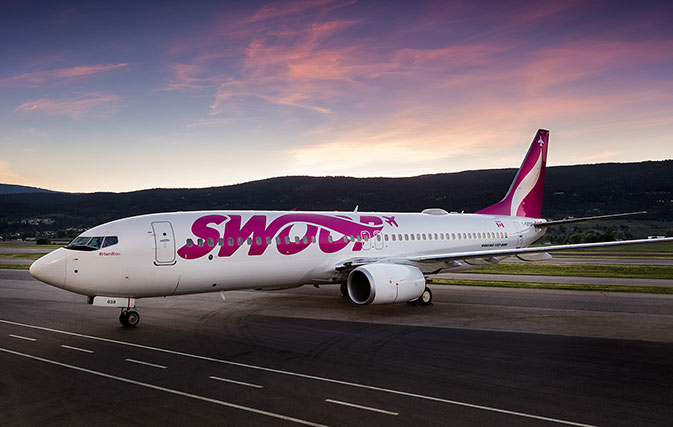CALGARY — WestJet says its ultra low-cost Swoop airline will soon begin transborder service as it looks to regroup from a “deeply disappointing” second quarter when it was hurt by the impact of a pilot strike threat, intensified competition and soaring fuel costs.
Details about routes and the official start date will be announced later this week.
Reports suggest the Calgary-based airline will fly to Las Vegas, Phoenix and Florida destinations including Orlando, Tampa, and Fort Lauderdale from low-cost airports in Canada like Hamilton and Abbotsford, B.C.
“We are clearly concentrating on those airports to help migrate the five million Canadians who are crossing the border to Buffalo and Bellingham and make sure that there’s less need to travel on North American counterparts,” WestJet CEO Ed Sims said Tuesday during a conference call.
Travelweek first reported on Swoop’s U.S. expansion back in June after interviewing Karen McIsaac, Senior Advisor, Communications at Swoop, who said that it was “only a matter of time before we begin to offer new destinations”. In addition to U.S. flights, McIsaac also confirmed the launch of international routes, possibly coming as early as this summer.
The airline recently received its third of six Boeing 737-800s to be delivered this year and is looking at possibly speeding up plans to expand to 10 planes by the fall of 2019.
“There will be opportunities to be profitable on those routes that WestJet with a higher CASM (costs) is not able to operate,” said Sims.
WestJet’s stock fell about 10 per cent in midday trading after the company reported a rare loss of $20.8 million in the second quarter and adjusted some of its 2018 expectations to reflect the impact of higher fuel costs.
The shares were down $1.95 at $18 on the Toronto Stock Exchange.
WestJet said its second quarter fuel cost was up nearly 31 per cent from a year ago, at 81 cents per litre, and that it expects the current quarter’s cost will be even higher at between 83 and 85 cents per litre.
Its net loss amounted to 18 cents per share, which was better than analyst estimates, but down from a year-earlier profit of $48.6 million or 41 cents per share.
WestJet’s revenue grew less than expected to $1.09 billion, compared with the consensus estimate of $1.1 billion.
The company has also reduced its plan for full-year capacity growth to between 5.5 per cent and 6.5 per cent, compared with the previous estimate of between 6.5 per cent and 8.5 per cent.
Air Canada had also indicated that it was considering a reduction in capacity in the fourth quarter because of higher fuel prices, which it said will likely push up ticket prices by an undisclosed amount.
